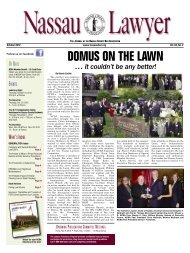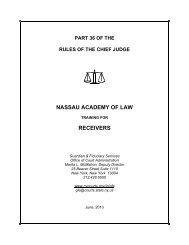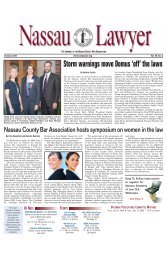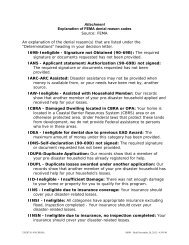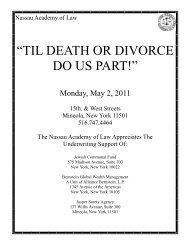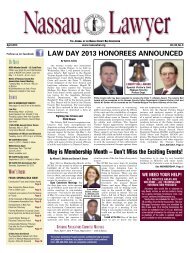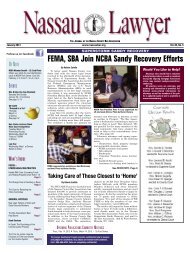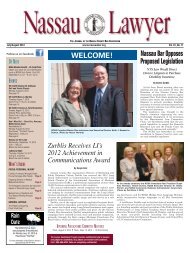Page 4991 F.2d 31(Cite as: 991 F.2d 31)revolving line <strong>of</strong> credit to KIC, secured by the NewYork Property. Key Bank ordered a title report whichdisclosed the transfers <strong>of</strong> the property from Kinderhillto KIC and the nominal consideration paid byKIC. Key Bank also received Kinderhill's auditedfinancial statements for fiscal year 1986, which disclosedthat “[t]he Court [adjudicating the CaliforniaAction] has indicated that it has decided to grantjudgement [sic] to the plaintiff in an amount approximating$1,250,000....” Key Bank approved theloan and, on March 13, 1987, KIC gave Key Bank a$2.5 million mortgage on the New York Property tosecure advances under the line <strong>of</strong> credit.On June 17, 1987, Orr obtained a judgment in theCalifornia Action against Kinderhill individually for$159,338, and against Kinderhill and Martin, jointlyand severally, for $1,071,489, plus prejudgment interest.The Ninth Circuit subsequently affirmed thatjudgment, but Orr has been able to collect only$42,000 from Kinderhill and Martin.In March 1991, Orr brought the present action againstKinderhill, KIC, Key Bank, Martin, his wife, and thetrustee <strong>of</strong> a trust established by Martin, seeking to setaside several transfers <strong>of</strong> property (including Kinderhill'stransfers <strong>of</strong> the New York Property to KIC) asfraudulent under Debtor & Creditor <strong>Law</strong> §§ 273 and273-a. After some discovery, both Orr and Key Bankmoved for summary judgment on the claims relatingto the validity <strong>of</strong> Key Bank's mortgages. Key Bankasserted several affirmative defenses, including aclaim that Orr's action was barred by the applicablestatutes <strong>of</strong> limitations.In an opinion and order dated August 26, 1991, JudgeCholakis denied the summary judgment motions. Heheld that the six-year limitations period <strong>of</strong>N.Y.Civ.Prac.L. & R. (“CPLR”) § 213(1) applied t<strong>of</strong>raudulent conveyance actions under both sections273 and 273-a. First, there being no evidence thatKey Bank was amenable to suit in California, he rejectedKey Bank's claim that California's four-yearlimitations period applied to the section 273 claimunder New York's borrowing statute, CPLR § 202.See Stafford v. International Harvester Co., 668 F.2d142, 152 (2d Cir.1981) ( “New York's borrowingstatute does not require the application <strong>of</strong> the statute<strong>of</strong> limitations <strong>of</strong> a jurisdiction if the cause <strong>of</strong> actioncould never have been brought in that jurisdiction.”).Second, he held that Orr's section 273-a claim wascontrolled by CPLR § 213(1)'s six-year limitationsperiod, not CPLR § 214(2)'s three-year period governing*34causes <strong>of</strong> action created by statute. On theother hand, he denied plaintiff Orr's motion for summaryjudgment because there were questions <strong>of</strong> factregarding whether KIC gave fair consideration for theNew York Property.After further discovery and additional submissions tothe court, both parties renewed their motions forsummary judgment. In an opinion and order datedMarch 30, 1992, Judge Cholakis granted summaryjudgment to plaintiff Orr on his 273-a claim, concludingthat KIC had not given “fair consideration” forthe New York Property. The district court granteddefendant Key Bank summary judgment on Orr'ssection 273 claim, thereby reversing itself on thestatute-<strong>of</strong>-limitations issue. Judge Cholakis held that,because Key Bank had now demonstrated that it wasamenable to jurisdiction in California, the actioncould have been brought there and, therefore, NewYork's borrowing statute did apply. Because Orr'ssection 273 claim was untimely under the Californialimitations period <strong>of</strong> four years, the court concludedthat Key Bank was entitled to summary judgment.Judge Cholakis entered a partial summary judgmentreflecting his opinion and he certified an interlocutoryappeal under Fed.R.Civ.P. 54(b). On appeal, KeyBank challenges Judge Cholakis's award <strong>of</strong> summaryjudgment to Orr on his section 273-a claim; and Orrcross-appeals Judge Cholakis's award <strong>of</strong> summaryjudgment to Key Bank on the section 273 claim.Statute <strong>of</strong> LimitationsDISCUSSION[1] Key Bank argues that Orr's claim under Debtor &Creditor <strong>Law</strong> § 273-a was barred by CPLR § 214(2),which imposes a three-year statute <strong>of</strong> limitations on“an action to recover upon a liability, penalty or forfeiturecreated or imposed by statute.” We agree withthe district court, however, that the three-year periodgoverning liability created by a statute does not applyto an action by a judgment creditor to set aside afraudulent conveyance.[2][3] CPLR § 214(2) “does not apply to liabilitiesexisting at common law which have been recognizedor implemented by statute.” State v. Danny's Fran-© 2009 Thomson Reuters. No Claim to Orig. US Gov. Works.
Page 5991 F.2d 31(Cite as: 991 F.2d 31)chise Sys., Inc., 131 A.D.2d 746, 746, 517 N.Y.S.2d157, 158 (2d Dept.1987), appeal dismissed, 70N.Y.2d 940, 524 N.Y.S.2d 672, 519 N.E.2d 618(1988). Rather, section 214(2) applies only when astatute creates a new liability that did not exist atcommon law and would not exist but for the statute.See Aetna Life & Casualty Co. v. Nelson, 67 N.Y.2d169, 174, 501 N.Y.S.2d 313, 315, 492 N.E.2d 386,388 (1986); Danny's Franchise Sys., 131 A.D.2d at746, 517 N.Y.S.2d at 158. Moreover, “ ‘the statutemust be essential to the cause <strong>of</strong> action’ [and].... thestatutory liability must truly be new.” Practice Commentaries,CPLR § 214:2, at 521 (quoting Bryden v.Wilson Memorial Hosp., 136 A.D.2d 843, 523N.Y.S.2d 686 (3d Dept.1988)). That the statutemerely enlarges the common-law scheme <strong>of</strong> liabilityor grants additional remedies is insufficient to bring itwithin CPLR § 214(2). State v. Cortelle Corp., 38N.Y.2d 83, 86-87, 378 N.Y.S.2d 654, 656-57, 341N.E.2d 223, 224-25 (1975); Danny's Franchise Sys.,131 A.D.2d at 747, 517 N.Y.S.2d at 159; State v.Bronxville Glen I Assocs., 181 A.D.2d 516, 581N.Y.S.2d 189, 190 (1st Dept.1992).Section 273-a provides:Every conveyance made without fair considerationwhen the person making it is a defendant in an actionfor money damages or a judgment in such anaction has been docketed against him, is fraudulentas to the plaintiff in that action without regard tothe actual intent <strong>of</strong> the defendant if, after finaljudgment for the plaintiff, the defendant fails tosatisfy the judgment.N.Y.Debtor & Creditor <strong>Law</strong> § 273-a.When Debtor & Creditor <strong>Law</strong> § 273-a was enacted in1961, the liability it imposed was not novel. Fraudulentconveyance actions were common in New Yorklong before 1961. See, e.g., Buttles v. Smith, 281N.Y. 226, 22 N.E.2d 350 (1939); Farmers' Loan &Trust Co. v. Meyer, 222 A.D. 123, 225 N.Y.S. 561(1st Dept.1927); *35West Shore Furniture Co. v.Murphy, 141 N.Y.S. 835 (Sup.Ct.Ulster County1913). Indeed, nearly four hundred years ago, theinfamous Star Chamber declared fraudulent a conveyanceby a debtor <strong>of</strong> all his goods and chattels toone creditor during the pendency <strong>of</strong> another creditor'saction. Twyne's Case, 76 Eng.Rep. 809 (Star Chamber1601); see also Hadlock v. Eric, 23 F.Supp. 692,693 (S.D.N.Y.1938) (“section 273 <strong>of</strong> the Debtor andCreditor <strong>Law</strong> does not itself create new liabilities butwas a codification <strong>of</strong> and the embodiment <strong>of</strong> existingpresumptions established by a long line <strong>of</strong> decisions<strong>of</strong> the courts <strong>of</strong> the State <strong>of</strong> New York”). Section273-a simply fleshed out the meaning <strong>of</strong> a fraudulentconveyance by stigmatizing certain conveyancesmade during litigation. Thus, CPLR § 214(2) doesnot apply to actions under Debtor & Creditor <strong>Law</strong> §273-a.[4][5][6] We agree with the district court that actionsunder section 273-a are governed by the six-yearlimitations period <strong>of</strong> CPLR § 213(1). See Martin v.Martin, 29 A.D.2d 864, 865, 288 N.Y.S.2d 374, 376(2d Dept.1968), aff'd in relevant part, modified onother grounds, 23 N.Y.2d 858, 298 N.Y.S.2d 68, 245N.E.2d 801 (1969); RCA Corp. v. Tucker, 696F.Supp. 845, 857 n. 9 (E.D.N.Y.1988). An action toset aside a fraudulent conveyance under section 273-ais an action for constructive fraud. See Republic Ins.Co. v. Levy, 69 Misc.2d 453, 454, 329 N.Y.S.2d 918,922 (Sup.Ct.Rockland Cty.1972). Compare Debtor &Creditor <strong>Law</strong> §§ 276 (governing actual fraud) & 276-a (authorizing award <strong>of</strong> attorneys' fees for pro<strong>of</strong> <strong>of</strong>actual fraud under § 276). And actions for constructive-ratherthan actual-fraud have long been subjectto the catch-all limitations period <strong>of</strong> CPLR § 213(1),see Dolmetta v. Uintah Nat'l Corp., 712 F.2d 15, 18(2d Cir.1983); Dybowski v. Dybowska, 146 A.D.2d604, 605, 536 N.Y.S.2d 838, 839 (2d Dept.1989), andits predecessor, Civ.Prac.Act § 53. See Hearn 45 St.Corp. v. Jano, 283 N.Y. 139, 144, 27 N.E.2d 814,817 (1940); Buttles, 281 N.Y. at 236, 22 N.E.2d at353; McCabe v. Gelfand, 58 Misc.2d 497, 499, 295N.Y.S.2d 583, 585 (Sup.Ct.Kings County 1968). Seegenerally Samuel M. Hesson, The Statute <strong>of</strong> Limitationsin Actions to Set Aside Fraudulent Conveyancesand in Actions Against Directors by Creditors <strong>of</strong>Corporations, 32 Cornell L.Q. 222, 224-27 (1946);Note, Statutory Limitation for Fraud Actions, 13St.John's L.Rev. 114, 115-19 (1938).Fair ConsiderationKey Bank also argues that the district court erred byholding that Kinderhill's conveyance <strong>of</strong> the NewYork Property to KIC was not supported by fair consideration.In the eyes <strong>of</strong> Key Bank, the transfer toKIC instantly inflated the value <strong>of</strong> KIC shares heldby Kinderhill, thereby providing the requisite fair© 2009 Thomson Reuters. No Claim to Orig. US Gov. Works.
- Page 1 and 2:
Nassau Academy of LawCLE Live Class
- Page 3 and 4:
McKinney's Debtor and Creditor Law
- Page 5 and 6:
McKinney's Debtor and Creditor Law
- Page 7 and 8:
McKinney's Debtor and Creditor Law
- Page 9 and 10:
McKinney's Debtor and Creditor Law
- Page 11 and 12:
McKinney's Debtor and Creditor Law
- Page 13 and 14:
McKinney's Debtor and Creditor Law
- Page 15 and 16:
McKinney's Debtor and Creditor Law
- Page 17 and 18:
McKinney's Debtor and Creditor Law
- Page 19 and 20:
BAKER & HOSTETLER LLP45 Rockefeller
- Page 21 and 22:
usiness of defendant Bernard L. Mad
- Page 23 and 24:
BACKGROUND, THE TRUSTEE, AND STANDI
- Page 25 and 26:
Madoff who received fraudulent tran
- Page 27 and 28:
ased on fictitious profits and for
- Page 29 and 30:
28. BLMIS funds were also used to p
- Page 31 and 32:
Madoff, and her niece, Shana Madoff
- Page 33 and 34:
42. Ruth Madoff was never an employ
- Page 35 and 36:
FIRST CAUSE OF ACTIONTURNOVER AND A
- Page 37 and 38:
66. At the time of each of the Two-
- Page 39 and 40:
Transfers; (b) directing that the S
- Page 41 and 42:
EIGHTH CAUSE OF ACTIONUNDISCOVERED
- Page 43 and 44:
TENTH CAUSE OF ACTIONDISALLOWANCE O
- Page 45 and 46:
111. Mrs. Madoff benefited from the
- Page 47 and 48:
WHEREFORE, the Trustee respectfully
- Page 49 and 50:
2(c)(3): (a) preserving the Subsequ
- Page 51 and 52:
302 B.R. 760 Page 1302 B.R. 760(Cit
- Page 53 and 54:
302 B.R. 760 Page 3302 B.R. 760(Cit
- Page 55 and 56:
302 B.R. 760 Page 5302 B.R. 760(Cit
- Page 57 and 58:
302 B.R. 760 Page 7302 B.R. 760(Cit
- Page 59 and 60:
302 B.R. 760 Page 9302 B.R. 760(Cit
- Page 61 and 62:
302 B.R. 760 Page 11302 B.R. 760(Ci
- Page 63 and 64:
302 B.R. 760 Page 13302 B.R. 760(Ci
- Page 65 and 66:
302 B.R. 760 Page 15302 B.R. 760(Ci
- Page 67 and 68:
302 B.R. 760 Page 17302 B.R. 760(Ci
- Page 69 and 70:
302 B.R. 760 Page 19302 B.R. 760(Ci
- Page 71 and 72:
394 B.R. 721 Page 1394 B.R. 721, 50
- Page 73 and 74:
394 B.R. 721 Page 3394 B.R. 721, 50
- Page 75 and 76:
394 B.R. 721 Page 5394 B.R. 721, 50
- Page 77 and 78:
394 B.R. 721 Page 7394 B.R. 721, 50
- Page 79 and 80:
394 B.R. 721 Page 9394 B.R. 721, 50
- Page 81 and 82:
394 B.R. 721 Page 11394 B.R. 721, 5
- Page 83 and 84:
394 B.R. 721 Page 13394 B.R. 721, 5
- Page 85 and 86:
394 B.R. 721 Page 15394 B.R. 721, 5
- Page 87 and 88:
394 B.R. 721 Page 17394 B.R. 721, 5
- Page 89 and 90: 394 B.R. 721 Page 19394 B.R. 721, 5
- Page 91 and 92: 394 B.R. 721 Page 21394 B.R. 721, 5
- Page 93 and 94: 397 B.R. 642 Page 2397 B.R. 642(Cit
- Page 95 and 96: 397 B.R. 642 Page 4397 B.R. 642(Cit
- Page 97 and 98: 397 B.R. 642 Page 6397 B.R. 642(Cit
- Page 99 and 100: 397 B.R. 642 Page 8397 B.R. 642(Cit
- Page 101 and 102: 397 B.R. 642 Page 10397 B.R. 642(Ci
- Page 103 and 104: 397 B.R. 642 Page 12397 B.R. 642(Ci
- Page 105 and 106: 397 B.R. 642 Page 14397 B.R. 642(Ci
- Page 107 and 108: 443 F.3d 180 Page 2443 F.3d 180(Cit
- Page 109 and 110: 443 F.3d 180 Page 4443 F.3d 180(Cit
- Page 111 and 112: 443 F.3d 180 Page 6443 F.3d 180(Cit
- Page 113 and 114: 443 F.3d 180 Page 8443 F.3d 180(Cit
- Page 115 and 116: 443 F.3d 180 Page 10443 F.3d 180(Ci
- Page 117 and 118: 443 F.3d 180 Page 12443 F.3d 180(Ci
- Page 119 and 120: Page 2257 A.D.2d 526, 684 N.Y.S.2d
- Page 121 and 122: Page 4257 A.D.2d 526, 684 N.Y.S.2d
- Page 123 and 124: Page 6257 A.D.2d 526, 684 N.Y.S.2d
- Page 125 and 126: 770 N.Y.S.2d 421 Page 22 A.D.3d 780
- Page 127 and 128: Page 14 A.D.3d 495, 773 N.Y.S.2d 71
- Page 129: Page 34 A.D.3d 495, 773 N.Y.S.2d 71
- Page 132 and 133: 780 N.Y.S.2d 409 Page 29 A.D.3d 553
- Page 134 and 135: Page 134 A.D.3d 231, 824 N.Y.S.2d 3
- Page 136 and 137: Page 334 A.D.3d 231, 824 N.Y.S.2d 3
- Page 138 and 139: Page 2991 F.2d 31(Cite as: 991 F.2d
- Page 142 and 143: Page 6991 F.2d 31(Cite as: 991 F.2d
- Page 144 and 145: FRAUDULENT TRANFERENCESRonald M. Te
- Page 146 and 147: Nursing home case_ Transfer of pers
- Page 148 and 149: Sections 548 and 544 work in concer
- Page 150 and 151: U.S. Supreme CourtBFP v. Resolution
- Page 152 and 153: example, from net 15 to COD; or cha
- Page 154 and 155: Bankruptcy Code Section§ 548. Frau
- Page 156: Ron Terenzi is a founding partner a



